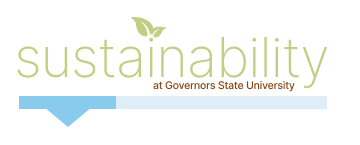Governors State has partnered with Energy Systems Group to assist in meeting its sustainability commitment by implementing energy conservation methods. ESG projects that GovState's carbon footprint will be reduced by more than 3,000 metric tons of carbon dioxide annually. This is equivalent to one of the following annual environmental benefits:
The University Sustainable Garden at GovState features 64 garden plots of various sizes and is located on the east side of The Family Development Center.
The gardens are open from dawn to dusk, May to October. The planting deadline is July 1. Gardens left unplanted on July 1 will be cleared and made available for reassignment.
The GovState Facilities Department oversees the seasonal operation of the garden. For more information, please visit the University Garden website.
Earth Day is on April 22. The university has a variety of events that encourage environmental responsibility and sustainability. From tree planting and recycling to swapping books and helping clean campus grounds, join us for one or more of these events and make your own positive contribution to the community.

GovState isn't just conscious of being environmentally friendly during Earth Day. The university is committed to sustainable initiatives year-round. Click Here to view a presentation. *Instructions: Click the right arrow at the bottom of the screen to start the presentation. | 
During the week of Earth Day and beyond, GovState has a full slate of events. Join us for one or for all of them and make your own contribution. Read More |
*State of Illinois Fuel Requirements*
(505 ILCS 150/5)
Sec. 5. State agency webpage requirements.
(a) Each State agency that maintains an Internet website may, subject to appropriation, include hypertext links to websites containing information on ethanol and biodiesel fuels. These hypertext links shall include any website maintained and operated by a State agency that posts information regarding E85 fuel or biodiesel fuel and may include private websites including, but not limited to, websites maintained and operated by:
(i) Illinois agricultural or health-related organizations; and
(ii) national agricultural, renewable fuel, or health-related organizations,
(b) For the purpose of this Act, "State agency" means any department, office, commission, board, or authority within the executive branch of State government, and includes State supported universities and colleges and the Illinois Building Authority. (Source: P.A. 95-749, eff. 7-23-08.)
Use the links below for more information regarding E85 and biodiesel fuels: